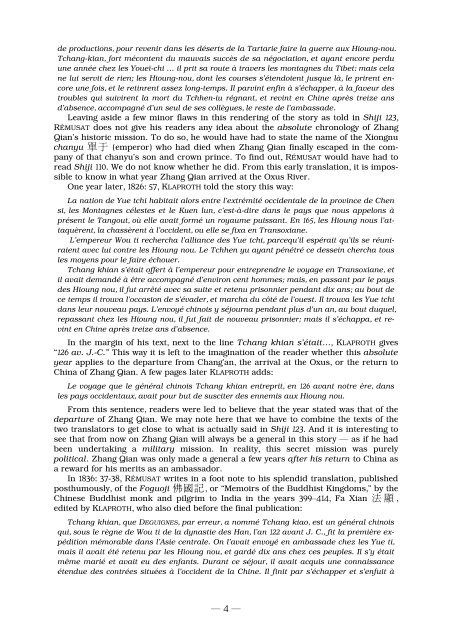張騫 Zhang Qian. The Secret Envoy of Han Emperor Wu in Search of the Arsi (Yuezhi) and the Fall of the Græco-Bactrian Kingdom. (Annotated Compilation of Eastern and Western Sources)
The study undertakes: — to clarify in what year Zhang Qian reached the Oxus river; to establish that the Daxia 大夏 in Shiji 123 represent the Tachar/Tochar of Tochar-i-stan; to explain how we are to understand the "List of Four" in Strabon 11.8.2.
The study undertakes: —
to clarify in what year Zhang Qian reached the Oxus river;
to establish that the Daxia 大夏 in Shiji 123 represent the Tachar/Tochar of Tochar-i-stan;
to explain how we are to understand the "List of Four" in Strabon 11.8.2.
Create successful ePaper yourself
Turn your PDF publications into a flip-book with our unique Google optimized e-Paper software.
de productions, pour revenir dans les déserts de la Tartarie faire la guerre aux Hioung-nou.<br />
Tchang-kian, fort mécontent du mauvais succès de sa négociation, et ayant encore perdu<br />
une année chez les Youeï-chi … il prit sa route à travers les montagnes du Tibet: mais cela<br />
ne lui servit de rien; les Hioung-nou, dont les courses s’étendoient jusque là, le prirent encore<br />
une fois, et le ret<strong>in</strong>rent assez long-temps. Il parv<strong>in</strong>t enf<strong>in</strong> à s’échapper, à la faveur des<br />
troubles qui suivirent la mort du Tchhen-iu régnant, et rev<strong>in</strong>t en Ch<strong>in</strong>e après treize ans<br />
d’absence, accompagné d’un seul de ses collègues, le reste de l’ambassade.<br />
Leav<strong>in</strong>g aside a few m<strong>in</strong>or flaws <strong>in</strong> this render<strong>in</strong>g <strong>of</strong> <strong>the</strong> story as told <strong>in</strong> Shiji 123,<br />
RÉMUSAT does not give his readers any idea about <strong>the</strong> absolute chronology <strong>of</strong> <strong>Zhang</strong><br />
<strong>Qian</strong>’s historic mission. To do so, he would have had to state <strong>the</strong> name <strong>of</strong> <strong>the</strong> Xiongnu<br />
chanyu 單 于 (emperor) who had died when <strong>Zhang</strong> <strong>Qian</strong> f<strong>in</strong>ally escaped <strong>in</strong> <strong>the</strong> company<br />
<strong>of</strong> that chanyu’s son <strong>and</strong> crown pr<strong>in</strong>ce. To f<strong>in</strong>d out, RÉMUSAT would have had to<br />
read Shiji 110. We do not know whe<strong>the</strong>r he did. From this early translation, it is impossible<br />
to know <strong>in</strong> what year <strong>Zhang</strong> <strong>Qian</strong> arrived at <strong>the</strong> Oxus River.<br />
One year later, 1826: 57, KLAPROTH told <strong>the</strong> story this way:<br />
La nation de Yue tchi habitait alors entre l’extrémité occidentale de la prov<strong>in</strong>ce de Chen<br />
si, les Montagnes célestes et le Kuen lun, c’est-à-dire dans le pays que nous appelons à<br />
présent le Tangout, où elle avait formé un royaume puissant. En 165, les Hioung nous l’attaquèrent,<br />
la chassèrent à l’occident, ou elle se fixa en Transoxiane.<br />
L’empereur Wou ti rechercha l’alliance des Yue tchi, parcequ’il espérait qu’ils se réuniraient<br />
avec lui contre les Hioung nou. Le Tchhen yu ayant pénétré ce desse<strong>in</strong> chercha tous<br />
les moyens pour le faire échouer.<br />
Tchang khian s’était <strong>of</strong>fert à l’empereur pour entreprendre le voyage en Transoxiane, et<br />
il avait dem<strong>and</strong>é à être accompagné d’environ cent hommes; mais, en passant par le pays<br />
des Hioung nou, il fut arrêté avec sa suite et retenu prisonnier pendant dix ans; au bout de<br />
ce temps il trouva l’occasion de s’évader, et marcha du côté de l’ouest. Il trouva les Yue tchi<br />
dans leur nouveau pays. L’envoyé ch<strong>in</strong>ois y séjourna pendant plus d’un an, au bout duquel,<br />
repassant chez les Hioung nou, il fut fait de nouveau prisonnier; mais il s’échappa, et rev<strong>in</strong>t<br />
en Ch<strong>in</strong>e après treize ans d’absence.<br />
In <strong>the</strong> marg<strong>in</strong> <strong>of</strong> his text, next to <strong>the</strong> l<strong>in</strong>e Tchang khian s’était…, KLAPROTH gives<br />
“126 av. J.-C.” This way it is left to <strong>the</strong> imag<strong>in</strong>ation <strong>of</strong> <strong>the</strong> reader whe<strong>the</strong>r this absolute<br />
year applies to <strong>the</strong> departure from Chang’an, <strong>the</strong> arrival at <strong>the</strong> Oxus, or <strong>the</strong> return to<br />
Ch<strong>in</strong>a <strong>of</strong> <strong>Zhang</strong> <strong>Qian</strong>. A few pages later KLAPROTH adds:<br />
Le voyage que le général ch<strong>in</strong>ois Tchang khian entreprit, en 126 avant notre ère, dans<br />
les pays occidentaux, avait pour but de susciter des ennemis aux Hioung nou.<br />
From this sentence, readers were led to believe that <strong>the</strong> year stated was that <strong>of</strong> <strong>the</strong><br />
departure <strong>of</strong> <strong>Zhang</strong> <strong>Qian</strong>. We may note here that we have to comb<strong>in</strong>e <strong>the</strong> texts <strong>of</strong> <strong>the</strong><br />
two translators to get close to what is actually said <strong>in</strong> Shiji 123. And it is <strong>in</strong>terest<strong>in</strong>g to<br />
see that from now on <strong>Zhang</strong> <strong>Qian</strong> will always be a general <strong>in</strong> this story — as if he had<br />
been undertak<strong>in</strong>g a military mission. In reality, this secret mission was purely<br />
political. <strong>Zhang</strong> <strong>Qian</strong> was only made a general a few years after his return to Ch<strong>in</strong>a as<br />
a reward for his merits as an ambassador.<br />
In 1836: 37-38, RÉMUSAT writes <strong>in</strong> a foot note to his splendid translation, published<br />
posthumously, <strong>of</strong> <strong>the</strong> Foguoji 佛 國 記 , or “Memoirs <strong>of</strong> <strong>the</strong> Buddhist K<strong>in</strong>gdoms,” by <strong>the</strong><br />
Ch<strong>in</strong>ese Buddhist monk <strong>and</strong> pilgrim to India <strong>in</strong> <strong>the</strong> years 399–414, Fa Xian 法 顯 ,<br />
edited by KLAPROTH, who also died before <strong>the</strong> f<strong>in</strong>al publication:<br />
Tchang khian, que DEGUIGNES, par erreur, a nommé Tchang kiao, est un général ch<strong>in</strong>ois<br />
qui, sous le règne de Wou ti de la dynastie des <strong>Han</strong>, l’an 122 avant J. C., fit la première expédition<br />
mémorable dans l’Asie centrale. On l’avait envoyé en ambassade chez les Yue ti,<br />
mais il avait été retenu par les Hioung nou, et gardé dix ans chez ces peuples. Il s’y était<br />
même marié et avait eu des enfants. Durant ce séjour, il avait acquis une connaissance<br />
étendue des contrées situées à l’occident de la Ch<strong>in</strong>e. Il f<strong>in</strong>it par s’échapper et s’enfuit à<br />
— 4 —


